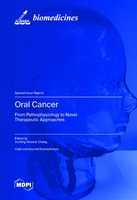Dublin Core
Title
OPEN ACCESS REPRINT Oral Cancer: From Pathophysiology to Novel Therapeutic Approaches
Subject
Biomedicines
Description
Oral cancer is a commonly occurring head and neck cancer, with 90% of cases diagnosed
as oral squamous cell carcinoma (OSCC). Histologically, OSCC is derived from a multistep
mechanism known as oral carcinogenesis, which progresses from normal epithelium to
hyperplasia, followed by dysplasia and carcinoma in situ, and precedes the development
of invasive squamous cell carcinoma. This multistep mechanism is characterized by
mutations related to copy number alteration and epigenetic modifications. Precision
medicine based on genomic profiling is also becoming more prevalent. It relies on the
genetic information of individual patients or specific cancer cells and how their genes
interact with each other and the environment. This method can potentially provide more
effective treatment strategies as approaches can be customized for the specific genetic
profiles of patients. Completing the TCGA HNSCC database has led to the development of
new therapeutic approaches and targeted therapies. Lately, immune checkpoint
inhibitors have been recognized as one of the standards of care in HNSCC. However,
although treating invasive SCC is crucial, implementing prevention strategies to preclude
malignant transformation has been useful in clinical management. Topics of interest for
this Special Issue include, but are not limited to: Precision medicine, i.e., targeted
therapies that inhibit oral carcinogenesis and tumorigenesis mechanisms; Combination
of novel therapeutic approaches with standard-of-care regimens in OSCC; Biomarkers,
i.e., predictive and prognostic markers for therapeutic approaches.
as oral squamous cell carcinoma (OSCC). Histologically, OSCC is derived from a multistep
mechanism known as oral carcinogenesis, which progresses from normal epithelium to
hyperplasia, followed by dysplasia and carcinoma in situ, and precedes the development
of invasive squamous cell carcinoma. This multistep mechanism is characterized by
mutations related to copy number alteration and epigenetic modifications. Precision
medicine based on genomic profiling is also becoming more prevalent. It relies on the
genetic information of individual patients or specific cancer cells and how their genes
interact with each other and the environment. This method can potentially provide more
effective treatment strategies as approaches can be customized for the specific genetic
profiles of patients. Completing the TCGA HNSCC database has led to the development of
new therapeutic approaches and targeted therapies. Lately, immune checkpoint
inhibitors have been recognized as one of the standards of care in HNSCC. However,
although treating invasive SCC is crucial, implementing prevention strategies to preclude
malignant transformation has been useful in clinical management. Topics of interest for
this Special Issue include, but are not limited to: Precision medicine, i.e., targeted
therapies that inhibit oral carcinogenesis and tumorigenesis mechanisms; Combination
of novel therapeutic approaches with standard-of-care regimens in OSCC; Biomarkers,
i.e., predictive and prognostic markers for therapeutic approaches.
Creator
Vui King Vincent-Chong (Ed)
Source
https://www.mdpi.com/journal/biomedicines/special
issues/oral cancer therapy
issues/oral cancer therapy
Publisher
MDPI St. Alban-Anlage 66 4052 Basel, Switzerland
Date
2023
Contributor
J®F
Rights
The book as a whole is distributed by MDPI under the terms and conditions of the Creative Commons Attribution-NonCommercial-NoDerivs (CC BY-NC-ND) license.
Format
Pdf
Language
English
Type
Textbooks
Identifier
ISBN 978-3-0365-9790-4 (Hbk)
ISBN 978-3-0365-9791-1 (PDF)
doi.org/10.3390/books978-3-0365-9791-1
ISBN 978-3-0365-9791-1 (PDF)
doi.org/10.3390/books978-3-0365-9791-1

